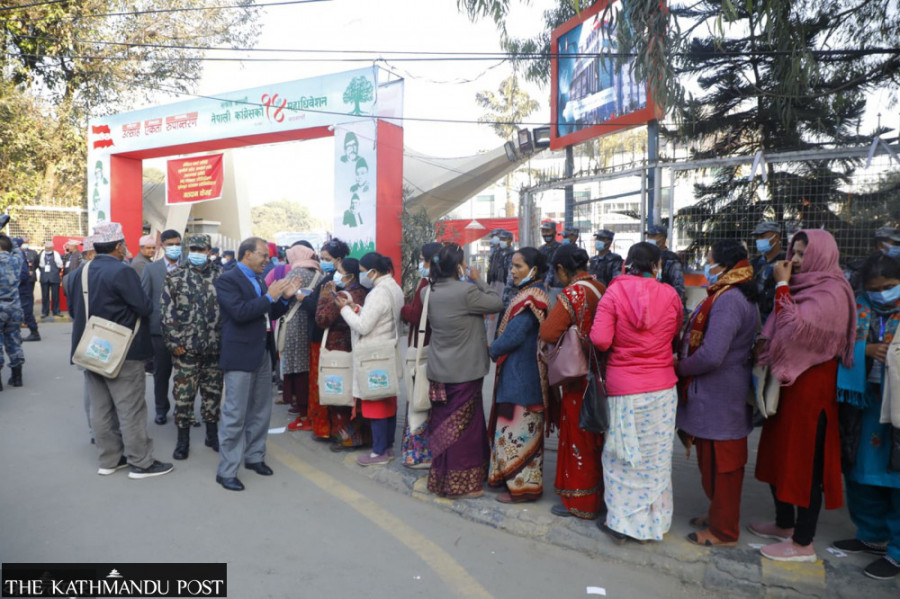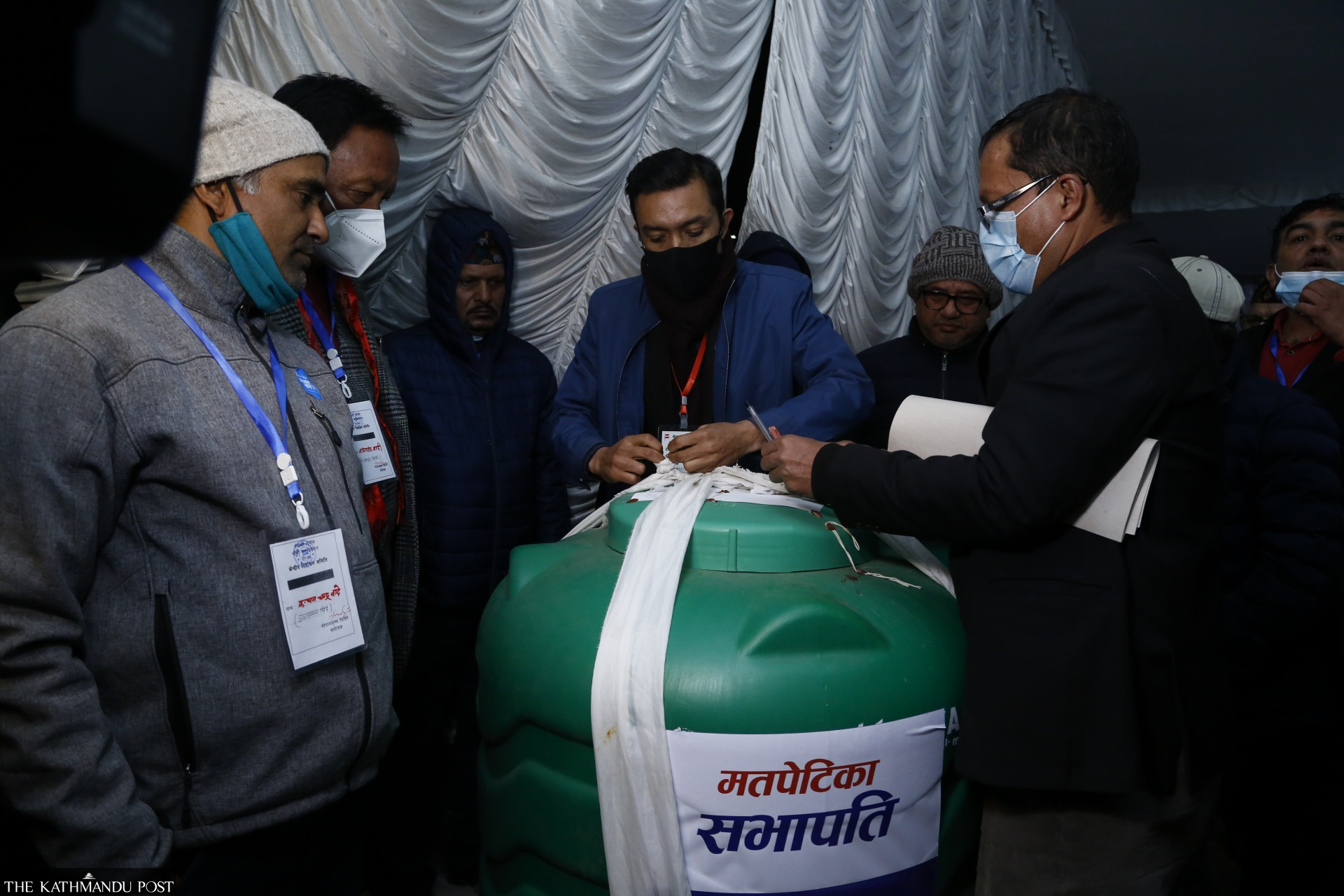
The Nepali Congress on Monday started voting to elect a new party leadership for the next four years, with a four-way strong contest for the top party post.
Incumbent party president Sher Bahadur Deuba, 75, is challenged by his old ally Bimalendra Nidhi, 65, as well as Shekhar Koirala, 71, and Prakash Man Singh, 65, for party president.
While insiders in the Deuba camp appear confident about their leader’s victory in the first round, chances of a run-off cannot be ruled out.
Nidhi, who broke his alliance with Deuba after over two and a half decades of togetherness, is in a bid to scuttle the sitting president’s plan to return for a second term. Another candidate, Singh, who led a mutiny inside his own camp, has vowed to unite against Deuba if elections go to a run-off.
To win the party president post, a candidate must secure 51 percent of the total votes cast.
As many as 4,743 delegates were set to vote to elect one party president, two vice presidents, two general secretaries and eight joint secretaries as well as 121 Central Working Committee members.
Voting scheduled to start at 8am on Monday got delayed by three hours, and till the time this paper went to press, delegates were still casting their ballots. According to the Central Election Committee of the party, the voting deadline was rescheduled until 11:30pm, though it was initially set for 5pm.

Prakash Chandra Timilsena/TKP
As party members wait for results, questions remain how the new leadership—whoever leads the party—is going to steer the party and the country.
A new leadership in the Congress will not only have the responsibility of steering the party but also of devising a clear-cut strategy for the next general elections.
The Congress that faced a spectacular defeat in the last elections in 2017 is in a bid to make a comeback.
Many inside the Congress believe the party can emerge as a single largest party given the disintegration of the communists, which had banded together in the 2017 elections.
The CPN-UML, a major communist force in the country, had forged an electoral alliance with the Communist Party of Nepal (Maoist Centre), a party that waged a decade-long insurgency, during the last elections. The communist behemoth swept the elections.
The UML and the Maoist Centre in May 2018 even announced their merger to form the Nepal C0mmunist Party (NCP). But infighting led to an implosion. The Supreme Court in March this year invalidated the merger, reviving the UML and the Maoist Centre. The UML also split in late August this year when the Madhav Kumar Nepal faction registered a new party—CPN (Unified Socialist).
The Congress sees an opportunity to capitalise on the division in the communist party.
But a lot depends on how the Congress elects a new leadership, analysts say.
Hari Roka, a political commentator, said that it is difficult to say at this stage whether the Nepali Congress can make a comeback.
“Firstly, it needs to figure out a way to reorganise itself in terms of ideology and structure,” Roka told the Post.
According to Roka, first and foremost, the Congress needs to revise its ideology and revamp the organisation, as the party left its core values and principles far behind long ago.
When the Nepali Congress was established in 1950, it had its fundamental principles clear—it aimed to be a liberal, democratic and socialist party.
Now, after six decades, the party is holding its 14th general convention.
“But it lost its way,” said Roka. “The party does not know at this time why it is electing a new leadership.”
Insiders and analysts say the question is not who wins from the party convention. The major concern, they say, is how the new leadership takes the party forward upholding its core values.
For the Congress, the ongoing convention holds significance not only in terms of the party structure and ideology but also in terms of making it a formidable force.
“An ideological clarity is the key,” said Shreekrishna Aniruddh Gautam, a political commentator. “We have to see whether the new leadership can go on the offensive… whether it can overcome the challenges in the changed context.”
Insiders and analysts say the Congress must introspect how it has fared in various elections after the restoration of democracy in 1990 if it wants to make a comeback from the next elections.
After the restoration of democracy in 1990, the party won the elections in 1991.
After the then prime minister Girija Prasad Koirala dissolved the House in 1994 over intra-party issues, the party lost the 1994 elections.
Later in 1999, the party made a comeback with majority seats. Three governments were formed under the leadership of Krishna Prasad Bhattarai, Koirala and Deuba.
Deuba, the incumbent party president and prime minister, was sacked in 2002 by then king Gyanendra Shah. But Deuba was appointed prime minister again by the same king in 2004. He was sacked again on February 1, 2005, when Gyanendra usurped power.
In the 2008 Constituent Assembly elections, the Congress faced a defeat. But in 2013, the party made a comeback, emerging as the single largest party.
Observers say the Congress has seen ups and downs but it by and large remained complacent until it faced a massive defeat in the 2017 elections.
Whether the party can be brought back in the reckoning depends a lot on how the delegates elect the new leadership, observers say.
Gautam, the political commentator, says time has come for the Congress to take an offensive approach.
“There must be clarity in ideology and there should be new blood in the party to implement the ideology,” said Gautam. “Under Deuba, I see a slim chance that the Congress can carry any ideological position forward. If some new faces like Gagan Thapa and Bishwa Prakash Sharma are elected, I see a fighting chance for the party.”
Harihar Birahi, a journalist who has followed Congress politics for decades, said the grand old party cannot afford the status quo anymore.
“It’s high time new faces came to lead the party,” Birahi who has edited several vernacular weeklies, including some close to the Nepali Congress, told the Post. “Ideology depends on what kind of leadership the Nepali Congress elects. But given the situation, I don’t think the party can make a qualitative jump. There, however, is hope that it can make some gradual improvement after this general convention.”













